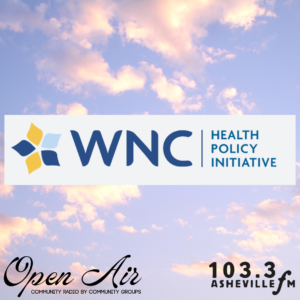Today on Open Air, we’ll hear from the WNC Health Policy Initiative podcast. Tune in live on Weds at noon or hear it in our archives for two weeks after broadcast!
School Meals as an Intervention for Food Insecurity in WNC
The Center for Disease Control and Prevention (CDC) identifies food insecurity as a “non-medical factor that influences health outcomes,” which is also known as a social determinant of health. From long-term impacts associated with “developmental, economic, social” factors, to diet-related illnesses such as cardiovascular disease or diabetes, food insecurity has an impact on health (as noted by the World Health Organization on their 2021 Malnutrition Factsheet).
In NC, following a 2022 submission to the NC Medical Journal, one in six children are food insecure, and seen in the USDA’s Food Access Research Atlas, over 1.6 million North Carolinians live in a food desert where healthy foods are not accessible. Since 2012, NC saw an increase in the number of food deserts.
For WNC in particular, the WNC Health Network (WNCHN) found that “the percent of adults in WNC consuming 5+ fruits and vegetables per day has decreased from 8% in 2015 to 5.6% in 2021” and “more than half of very low-income adults in WNC have experienced food insecurity in the past year.” Data collected by the WNCHN also shows that rates of cardiovascular disease and Type 2 Diabetes in WNC are consistently higher than the rest of NC and the country.
To improve health outcomes in our region associated with food insecurities, the NC Alliance for Health (NCAH) supports a Free School Meals for All program to work as a preventative strategy. In this installment of the HPI Podcast, Andrew Rainey speaks with Marianne Weant and Alecia Sanders of the NCAH about food insecurity, the School Meals for All Campaign, what we learned from implementing a similar program in NC during COVID, political challenges, and both state and local considerations for implementation. Check out the website at wnchealthpolicy.org for more installments of the HPI podcast and to learn more about public health issues in WNC.
More Posts for Show: Open Air
